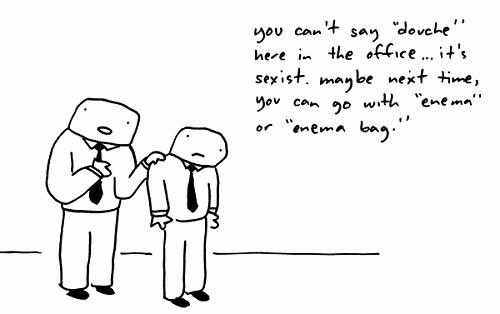Sarah H commented about handsomeness and masculinity.
I find it really useful to consider ideas of handsomeness in relation to concepts of masculinity— I can see where my own notions of handsomeness are based in someone (of any gender) being visibly self-controlled, unemotional and hardened. I wonder how we can reclaim words like this— like how do we compliment our loved ones on looking cute, without using words that reinforce these concepts of masculinity? I have tended to use the word handsome, but now it doesn’t seem appropriate.
I am interested in this too. I hadn’t considered the word handsome before, but I use it a lot (also to describe a person of any gender). After some reflection, I think for me it is a replacement for saying something more personal and honest. I’m making a judgment about beauty and gender instead of attending to my feelings and needs. There is an idea I like in non-violent communication, that making judgments reinforces hierarchy and external authority. From Nonviolent Communication: A Language of Life:
Most of us grew up speaking a language that encourages us to label, compare, demand, and pronounce judgments rather than to be aware of what we are feeling and needing. …
Life-alienating communication both stems from and supports hierarchical or domination societies. Where large populations are controlled by a small number of individuals for their own benefit, it would be to the interest of kings, czars, nobles, etc. that the masses be educated in a way that renders them slave-like in mentality. The language of wrongness, “should” and “have to” is perfectly suited for this purpose: the more people are trained to think in terms of moralistic judgments that imply wrongness and badness, the more they are being trained to look outside themselves— to outside authorities— for the definition of what constitutes right, wrong, good and bad. When we are in contact with our feelings and needs, we humans no longer make good slaves and underlings.
To work for anarchist/non-hierarchical relationships, I’ve been practicing not judging things as “masculine” or “feminine” and instead just saying what they are and how I feel about them. E.g., If I let go of describing a boy or man as effeminate, I can usually find more accurate, specific observations. Maybe he’s caring and kind, and likes to wear bright colours. And maybe I feel happy about that because I value kindness and diverse clothing options. I forget this all the time, but when I remember to get specific I like the way it makes me more aware of both the person and myself. I also like that it goes beyond resisting within binary gender and gets outside of gender altogether. Instead of questioning who can have feminine qualities, it is a way of questioning why we call some things feminine at all. I think that celebrating a man or boy for his feminine qualities still reinforces that passive, traumatized personalities are called feminine while aggressive, traumatized personalities are called masculine.
I’m thinking I could replace “handsome” the same way, with concrete observations and personal feelings. On top of letting go of judgments about gender (anyone can have a strong jaw or dark eyebrows), it would skip judgments about who looks more or less beautiful. Previously I’ve tried celebrating everyone as beautiful “in their own way” but I find it works the same way as celebrating genderblurred masculine and feminine qualities. It still reinforces the idea that I can judge who is beautiful or ugly and that it matters. I’d rather find ways to take responsibility for what I see and how I feel about it.
That has me wondering what I am trying to communicate when I tell someone they look handsome. I like to look at them? That is still very vague. I think they have social power because they fit a currently fashionable ideal look? I don’t want to play that game. When I look at their nose I feel hot and bothered? That is more what I’m aiming for. I think I’m using compliments as a substitute for conversations about desire and sensual appreciation. Wow. I would way rather have the desire/appreciation conversation.
I’m going to try eliminating handsome from my vocabulary for a few days, to find out what else I can talk about. I’m not sold on permanently eliminating words that describe judgmental categories because I also use them to talk about politics and the categories themselves, but a temporary ban seems like a good experiment in awareness.
More ideas?

